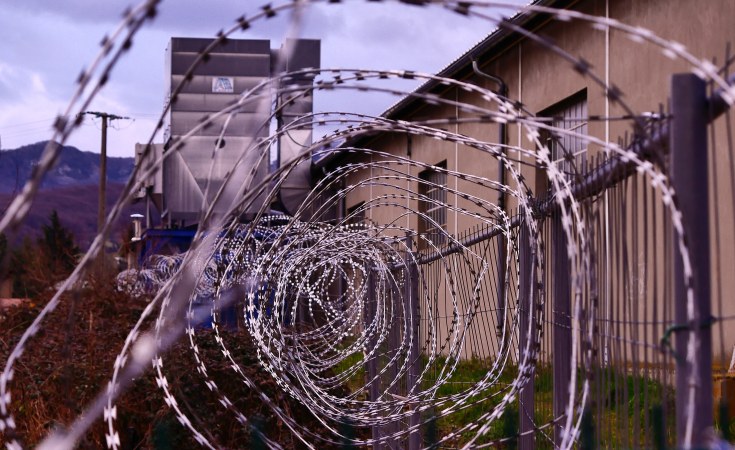On the night of 5 July 2022, 879 inmates escaped from the Kuje correctional facility in Abuja, Nigeria after an attack by suspected Boko Haram terrorists. Prior to this, the largest jailbreak was on 5 April 2021 when gunmen attacked Owerri correctional centre, Imo State and freed 1,844 inmates. There have been 14 jailbreaks since President Muhammadu Buhari assumed office in May 2015. The Conversation Africa asked sociologists Lanre Ikuteyijo and James Olabisi Ayodele how Nigeria can better secure its correctional facilities.
What do you think is responsible for the jailbreaks?
Nigeria's criminal justice system inadvertently facilitates jailbreaks because of under-funding, shortage of personnel, overcrowding, use of antiquated techniques and other challenges.
In our research, we have advocated for changes to the thinking behind the prison system. First with a change of name from prisons to correctional facilities. This will emphasise rehabilitation and reform as against retribution, which the former system rested on. Then the system needs rehabilitative programmes, recreational and vocational training, and training and retraining of officers. Collaboration between educational, health and other security agencies is also required to bring about a change of philosophy.
Second, the re-categorisation of correctional facilities is long overdue, especially with the threats of terrorism, banditry and kidnappings. This will ensure that criminals are kept in proportion to their threat to the society. We might have to build and equip facilities that can cater for different categories of inmates. The present arrangement allows recidivists and hardened inmates to be kept with minor and first time offenders. This is dangerous.
Inmates are classified in terms of their risks and the seriousness of the crimes they committed, based on the United Nations' system. Suspected and convicted terrorists are kept in medium security facilities. This is a huge mistake: all the jailbreaks in the past seven years have been from medium security facilities.
It costs society a lot of money to apprehend criminals and jail them. Attempts to break them free are undermining the criminal justice system and truncating inmates' reformation process. This surely has consequences for rates of crime.
What can we learn from the jailbreaks?
Prison congestion is a major challenge to correctional facilities in Nigeria. Also, the over-reliance on imprisonment as a form of punishment in Nigeria is not helping matters. Alternatives to imprisonment include fines, probation, parole, community service, restitution and early release.
The justice system is inefficient. Currently, 71% of the 74,675 inmates in Nigeria's correctional centres are awaiting trial. This is very high by international standards, especially the Mandela Rules, which guide prison conditions globally.
Moreover, the nature of jailbreaks in recent years reflects the political economy of the country. They have been traced to activities of terrorists, insurgents and secessionists. Most of the incidents have been influenced by ideological, religious and political motives.
The immediate implication is the need to dispense justice as quickly as possible and reduce the traffic in prisons. Alternatively, establish separate facilities to hold special categories of inmates who are a grave danger to the security of the country. The correctional facilities in Nigeria should reflect the dynamic climate of crime and criminality in the country.
Correctional facilities also contribute to the peace and tranquillity of any society because they keep the "trouble makers" out of circulation. They also endeavour to reform, rehabilitate and reintegrate offenders.
How can Nigeria make its prisons more secure?
They will be more secure when they are not overcrowded and neglected. For instance, Makurdi medium security prison in Benue State, north central, built in 2002 with a capacity for 240, housed 866 in 2018. Kaduna Convict Prison, north west, built in 1915 with a capacity for 547, had 1,217 inmates in the same audit report. Port Harcourt prison in the southern part, built in 1925, had a capacity for 804 but housed 3,827 in 2018. Most of the facilities are deteriorating and require face-lifts.
There is a need to invest more in modern technology in the facilities. Surveillance systems and alarm systems should be installed. The records of inmates should be biometric and stored in the cloud. This will serve as a disincentive and facilitate the recapture of any escapee. Inmates should be properly classified and placed in accordance to their level of risk and need for rehabilitation.
What should be done to prevent further jailbreaks?
First, reclassify correctional facilities.
Second, the correctional facilities must be properly funded, given their rising importance in the management of crime and criminality in the country. The allocation to Nigeria Correctional Service has increased steadily under the Buhari administration. The impact, however, is yet to show as overcrowding persists. A total of N613 billion was allocated to the agency in 10 years (2010-2019). N17 billion (about US$16.851 million) is spent every year to feed inmates in 244 correctional centres but inmates still live in a terrible environment. Currently there are 74,191 inmates in correctional centres across Nigeria.
Prison staff must also be trained and retrained in line with the latest trends of criminality. The first training school for prison staff was established in Enugu, south east Nigeria in 1947 and there are training courses after employment too. But there is room for improvement. Some non governmental organisations are involved in training prison staff too.
Prison managers should be equipped to deal with the most violent and extremist prisoners, as well as with incidents of violence in prisons. Efforts should be made to decongest the prisons and improve the living conditions of inmates. Lastly, staff of correctional facilities should be well motivated to enhance job commitment and improve performance.
James Olabisi Ayodele, Associate Professor, Obafemi Awolowo University
Lanre Ikuteyijo, Senior lecturer, Obafemi Awolowo University


